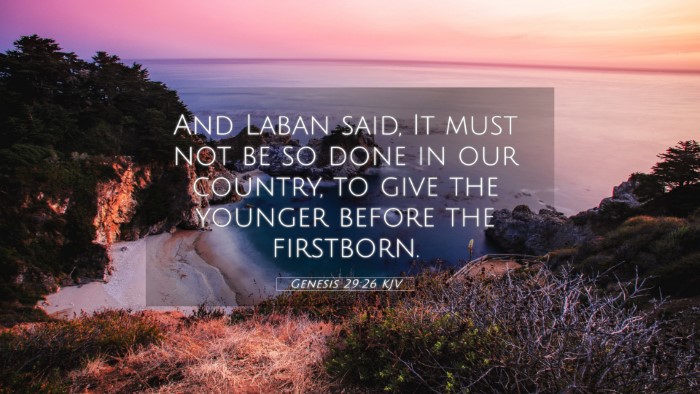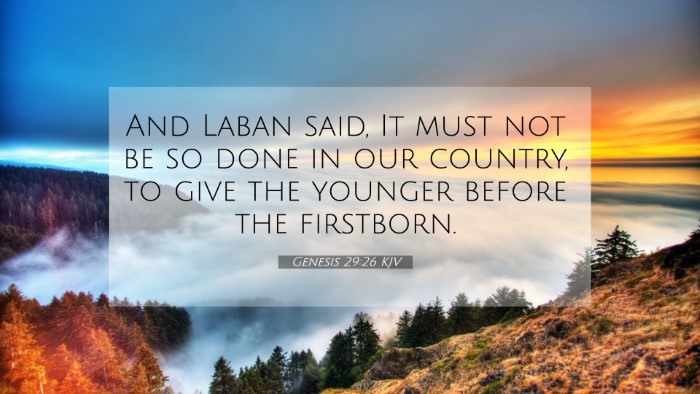Understanding Genesis 29:26
Verse: "And Laban said, It must not be so done in our country, to give the younger before the firstborn."
Overview of the Context
This verse emerges from the narrative of Jacob's marriages to Leah and Rachel. After serving seven years for Rachel, Jacob finds himself unexpectedly wed to Leah. Laban, Rachel's father, explains the customs of their land regarding marriage.
Commentary Insights
- Matthew Henry: Henry emphasizes Laban's cunning nature and the deceit involved in the marriage arrangement. He interprets Laban's rationale as an enforcement of customary practices, underscoring the importance of cultural norms in biblical times.
- Albert Barnes: Barnes notes that Laban's statement reveals a broader social framework concerning marriage. He highlights the significance of the firstborn in ancient societies and suggests that this tradition reflects God's order in family structures, which continues throughout Scripture.
- Adam Clarke: Clarke provides a historical perspective on Laban's action, viewing it as a strategic move to maintain family ties and prevent rivalry among sisters. This commentary illuminates the complexities of familial relationships in the Old Testament.
Thematic Bible Verse Connections
The verse presents a profound opportunity to explore the themes of deception, familial duty, and the sovereignty of God over human affairs. Here are some related Bible verses that illustrate these themes:
- Exodus 21:15: Discusses the rights of the firstborn.
- Deuteronomy 21:15-17: Offers laws concerning inheritance rights among heirs.
- Genesis 25:29-34: The story of Jacob and Esau highlights favoritism and its consequences.
- Genesis 30:1-2: Rachel's bitterness toward Leah also reflects themes of familial rivalry.
- Luke 14:26: Jesus discusses the nature of discipleship and prioritizing relationships.
- Roman 9:13: "As it is written, Jacob have I loved, but Esau have I hated," discussing divine selection and its implications.
- Hebrews 12:16-17: Warns against immorality and the rejection of God's covenant, paralleling the birthright narrative.
Connections to Biblical Principles
This verse heavily relates to the overarching biblical principle of God’s order in creation and family structures, which is echoed throughout Scripture. Laban's assertion of custom reminds readers to explore:
- How does the position of the firstborn play a role in God's covenant history?
- What implications does Laban’s custom have on our understanding of family dynamics?
Inter-Biblical Dialogue
The connections between this narrative and others in the Bible create a rich tapestry. The custodial care of the firstborn can be seen throughout various book genres, from historical texts to epistles:
- Reflections on firstborn rights in Galatians 4:4, relating to Christ as the firstborn over creation.
- The parallels between Jacob and Jesus regarding familial struggle and divine purpose.
- Comparative insights between the treatment of Leah and Rachel and the broader biblical discourse on women’s roles and rights.
Study Methods & Resources
To engage deeply with the narrative of Genesis 29:26, consider utilizing various tools for cross-referencing:
- Bible Concordance: Use a concordance to find related terms and themes.
- Bible Cross-Reference Guide: Enable easier navigation through intertwined narratives.
- Cross-Reference Bible Study: Techniques for thematic studies and linking scriptures.
- Comprehensive Bible Cross-Reference Materials: Gather topical resources to enhance understanding.
Conclusion
Genesis 29:26 is not merely a statement of cultural practice but serves as a pivotal point in discussing the nuances of familial relationships, individual choices, and God's overarching plan. By cross-referencing with related scripture, we can uncover deeper theological insights and appreciate the continued relevance of ancient customs in modern faith contexts.


